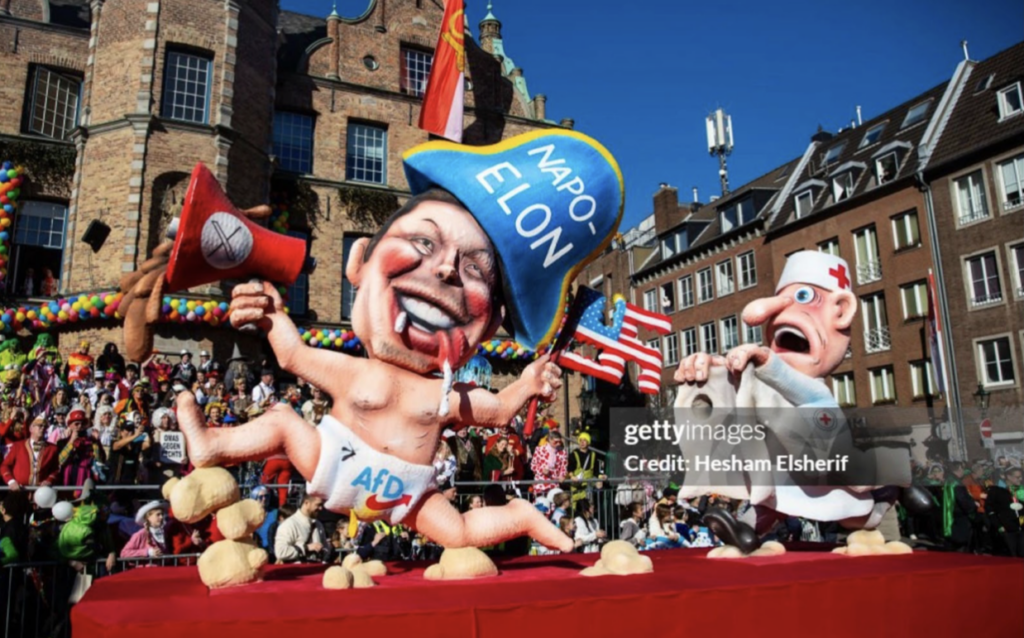By: Julia Heins

Germany’s most notorious celebration hinges on two things, mockery and parody. As hundreds of thousands of people take the streets to engage in the historic tradition of Carnival, they are met with parade floats that not only showcase politically relevant figures, but controversial scenes depicting recent political events. The lively figures are crafted from wire, paste, and acrylic paint and can exceed up to 50 feet in length. Some depicted figures include not only German politicians but U.S. political figures such as Elon Musk and Donald Trump. Popular sculptors like Jacques Tilley are the superstars behind the creation of these elaborate floats. This year, Tilley oversaw the building, shaping, and painting of 100 floats. As a float builder in the city of Düsseldorf Carnival for 40 years, many find that his role as a satirist is necessary especially in politically turbulent times within Germany and beyond.
Carnival originated as a means to build community by “temporarily abolish[ing] existing social barriers.” Since the time of the Roman Empire, Carnival has been a relevant political tool used by Germans. The festivities begin in November and continue into March, where elaborate street parades commence. In major cities like Cologne, Aachen, and Düsseldorf, parades attract hundreds of thousands of attendees each year. Visitors are attracted by more than just celebration; the political floats draw the eyes of thousands not only at the parade but on social media. One such float, pictured above, mocks the right-wing political party the Alternative for Germany (AfD), Elon Musk, and the United States. When asked about the influence of Carnival, Tilley, the float’s creator, stated, “[i]n Carnival this is our time. We have the power.” Political sensitivities are heightened on a massive scale, encouraging viewers to creatively express their political grievances. Other popular floats in this year’s celebration highlight Putin and his full-scale invasion of Ukraine, the failures of Germany’s coalition government, and Donald Trump. These floats do not shy away from controversy. Despite being neutral in party politics, Tilley explains how “[h]e treat[s] all parties equally, only the AfD more equally.” Political satire has always been used, yet the existence of Carnival elevates it to a much larger scale.
A celebration with the same level of political awareness and impact does not exist in the United States. Each float is controversial, yet showcases a level of political freedom that ultimately is not matched in the U.S. Ridicule, caricatures, and more are all integral to debate culture, mirroring the key elements that define various carnival floats. Outside of Germany’s borders this celebration is viewed in a very different light. While the U.S. upholds freedom of speech, the use of political satire in such a popular celebration would subsequently lead to significant controversy or backlash.
How is this allowed in Germany then? Article 5 of the Basic Law (Germany’s Constitution) guarantees freedom of expression and artistic freedom. The celebrations have been constantly protected by German courts claiming that the floats are “acknowledged as a form of exaggeration” which does “not need to be either objective or factual.” The concept of Carnival originates from the need for arenas of critique. This need has been met in Germany — but what about in the US? Political critique is considered a democratic necessity. In the US, different cultural spaces such as online forums, late-night shows, and protests provide a space for political critique. However, the storied tradition of Carnival does not have its equivalency in the US. For one, Carnival is still an area for tolerance of diverse opinions. Despite floats aimed at certain political parties or politicians, they aren’t a vehicle to incite direct violence. Symbolic political expression reigns supreme as satire is employed not only through Carnival, but popular German television shows such as “Nur im ersten,” “Die Anstalt,” and “heute-show,” which have gained popularity in making fun of top German politicians. Similar networks, such as late-night shows in America, do exhibit satirical elements but ultimately don’t hold the same political power as other public means of protest. The question of accessibility is also a part of this conversation. Carnival is unique in the breadth of its celebration, ranging from large cities to small towns.
The political spectacle of Carnival not only engages citizens but raises awareness for political events on a global scale. Reforming the ideal of the public protest into a celebratory form serves populations with alternative forms of political expression. As political polarization rises in the US amidst the recent election of Donald Trump, it is beneficial to view alternative methods of protest to enact change in different forms.

